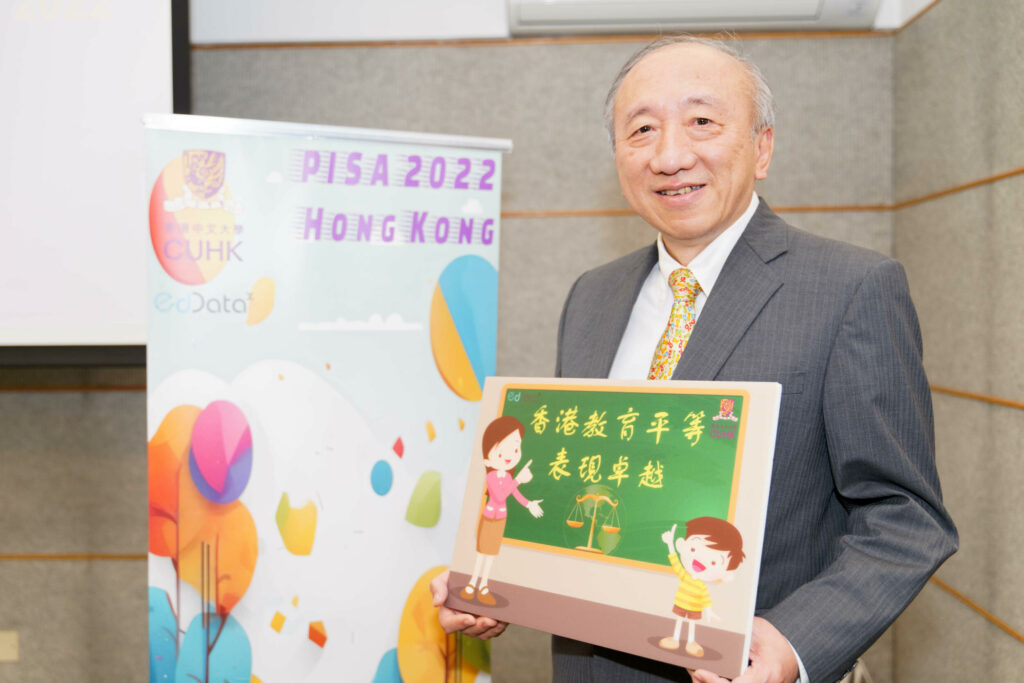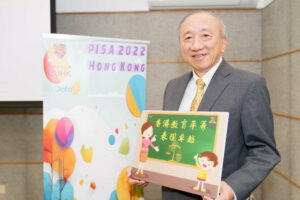CUHK
News Centre
CUHK announces the Programme for International Student Assessment (PISA) 2022 results, Hong Kong students excel globally amid COVID-19 challenges
The Chinese University of Hong Kong (CUHK)’s EdDataX Research Centre, commissioned by the Education Bureau, conducted the Programme for International Student Assessment (PISA) 2022 study for Hong Kong. The findings revealed that Hong Kong’s 15-year-olds continue to stand out among 81 countries and economies. Compared to the results in 2018, they remained in fourth place for their mathematics performance and their science scores climbed from ninth to seventh place, while they dropped from fourth to 11th place in reading. During the COVID-19 pandemic, students likely allocated more time to subjects like science and mathematics, which are comparatively easy to evaluate. In contrast, progress in reading may have been deprioritised.
PISA, orchestrated by the Organisation for Economic Co-operation and Development (OECD), and conducted triennially, aims to evaluate 15-year-olds’ basic skills in mathematics, science and reading, with mathematics as the focus in 2022. The CUHK EdDataX Research Centre carried out Hong Kong’s assessment between May and July last year, involving 5,907 students at 163 randomly selected secondary schools, along with their principals, teachers and parents.
The study reaffirmed that Hong Kong students continue to rank highly among 81 countries and economies. Science scores slightly increased from 517 to 520 points between 2018 and 2022, while mathematics and reading scores, despite dropping from 551 to 540 and 524 to 500 points respectively, remained substantially above the international averages.
Hong Kong schools excel in supporting learning during pandemic school closures
The 2022 assessment saw a general decline in performance across various countries and economies. 41 countries and economies experienced a drop in mathematics scores and 35 in reading, compared to 2018. However, most maintained relatively stable science scores.
Globally, schools being closed for shorter durations due to COVID-19 seemed to correlate with a lower negative impact on scores. PISA 2022’s survey indicated that 53% of Hong Kong students experienced school closures exceeding three months, slightly higher than the OECD average of 50%. During the assessment, Hong Kong was recovering from its fifth COVID-19 wave, with secondary schools maintaining half-day sessions. During these disruptions, 36% of Hong Kong students reported facing academic challenges at least once a week, slightly above the OECD average of 34%. Nonetheless, Hong Kong schools were exceptional in supporting continuity of student learning during closures, with 75% of students engaging in daily online classes, significantly above the OECD average of 51%.
Outstanding educational equity in Hong Kong
Hong Kong’s performance in educational equity remained second globally, indicating successful support for students from disadvantaged backgrounds. 17% of socio-economically disadvantaged students ranked in the top quartile in mathematics, a stark contrast to the OECD average of 10%.
Another key focus of PISA 2022 was the integration of immigrant students. Hong Kong’s performance was remarkable, with immigrant students performing on par with local students across all assessment areas. 8% of these students are first-generation immigrants, highlighting Hong Kong’s commitment to inclusive education and support for all student groups.
PISA’s data aids participating countries and economies in understanding performance variations among students and evaluating the efficacy of their educational systems. Andreas Schleicher, Director for Education and Skills at the OECD, noted, “Success in PISA demands students have the ability to extend beyond known concepts, think interdisciplinarily, apply knowledge innovatively in unfamiliar situations and showcase effective learning strategies.” Additionally, PISA 2022 introduced a study of creative thinking, with results expected to be published in mid-2024.





